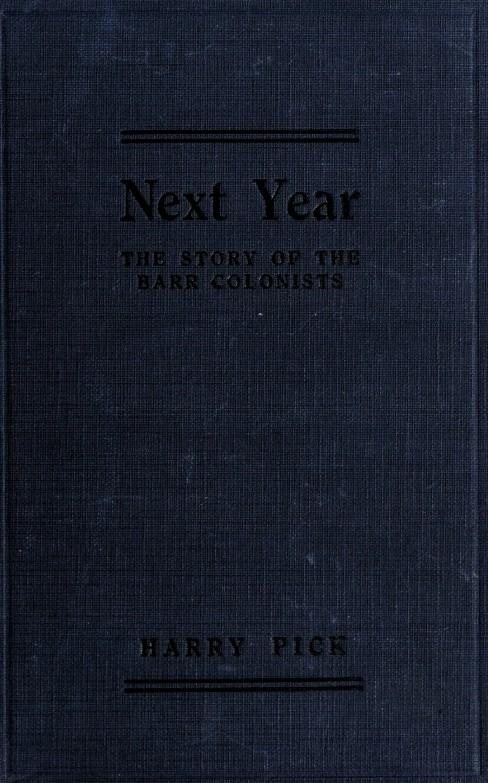XVIII. Wilderness—Planning for Next Year
AUTHOR'S NOTE
When the S.S. Lake Manitoba carried two thousand all-British Barr Colonists across the Atlantic a quarter of a century ago, she didn't exactly cover herself with glory. Her Board of Trade passenger rating was eight hundred odd.
In one cabin for'ard there were packed three hundred human beings— single men; or what practically amounted to the same thing (as a facetious wag whose wife had run off with the milkman put it)—married men travelling without their wives.
A similar cabin aft enclosed a like number of males. Amidships, but a story or two higher up, the steerage accommodation was crowded with unattached females and married people with their younger children. Recently used as a transport in the South African War, the Lake Manitoba had had her decks and holds painted a snowy white, and divided into compartments with gunny sacking. Into numbers of these elastic cubicles as many as six married couples were squeezed.
Privacy was impossible. No one could undress properly. The drinking water was rotten; the food was worse. The sanitary conveniences would have shamed a monkey cage. The snow-white paint on the woodwork turned out to be merely whitewash, and, when the vessel received a smart smack from a wave, large flakes of it fell off along with the dried undercoat of manure.
Up above, the aristocrats travelled first-class. Theirs was the only passenger accommodation the ship really possessed. Nearly everyone aboard could have afforded to travel cabin, but only those whose applications were received first managed to secure the limited number of
berths available. The rest—about sixteen hundred of them—put up with the crudest of steerage fare.
For an interesting view of life aboard an emigrant ship, the single men's cabin for'ard was unique. All sorts and conditions of British middle-class homes were represented, and although it was rather a lot of men to cram into one room, it speaks well for British love of law and order to record that only eleven fights, seven incipient mutinies, three riots, and twenty-two violent interviews with Barr, the party's leader, occurred during the voyage.
This cabin was deep down below the water line. When any of the fellows felt that they needed air, they went up on deck for it. Quite right, too. Why should young single men have things carried down to them?
Climbing to the deck for air worked all right for everybody except those who were dying from seasickness, of whom there were about a score. These poor devils stuck in bed throughout the whole of the voyage. Fortunately, the ship crossed in twelve days, so they didn't have to breathe the same air above a million times.
This cabin stretched clean across the boat. It was one of the holds. As previously stated, it was well up in front, where the men got a longer ride for their money—up and down, as well as forward. The "beds" were in tiers of three, with long tables placed with charming thoughtfulness down the aisles, so that the seasick sufferers might obtain a clear view of the grub.
The occupants of the cabin were pretty quiet during the first couple of days out from Liverpool. The band on the dock had played some haunting melodies, and everyone knows how greatly young single men are affected by such things. Besides, there was only an old plank floor separating them from the place where the bilge was stored.
But presently they became more sprightly. Some chap started a little hymn singing, in between two tiers of bunks where a couple of fellows lay dying. It was highly pathetic. One of the invalids, a little, sallow-faced beggar, was in frightful throes; but, in spite of being almost a goner, he revived sufficiently to curse something awful every time the glee singers struck up "Shall We Gather at the River?"
Across in one corner, a gang played ha'penny nap throughout the trip. Bottles of Guinness, like labelled black ninepins, stuck up all round them. Everyone in the cabin smoked, of course; thus any germs propagated by the overcrowding were quickly choked to death.
About half-way along one side of the stateroom, a dozen budding scalp hunters had crucified the effigy of a man—Barr, it was supposed to represent—on the wall of the ship, and were practising knife throwing. Many men wore bowie knives. Indeed, barring bows and arrows and 8-inch howitzers, they had brought almost a complete arsenal aboard. No man who considered himself sane would dream of venturing into the Far West in those days without being thoroughly armed, so why shouldn't a green Englishman protect himself?
In the middle of the cabin, in a sort of island of space—which the authorities had apparently overlooked—an orchestra practised many times daily. Two fiddles, a melodeon, a cornet, and a telescopic harmonium ground out the music.
Those were the days before civilization had sunk into the depravity of jazz. The orchestra dispensed such noble airs as: "Count Your Blessings," "Daddy's on the Engine," and such like popular tunes of the day, interspersed with a few of Lottie Collins' and Moody and Sankey's special hits. Some of the dying men frequently called for encores. These were hardly ever refused.
In another corner, a chap, who several years previously had spent three weeks in Alaska, lectured on prairie farming. His dialect was pure Tyneside. It was hard work for him, particularly during orchestra rehearsals, but he managed quite well in the intervals.
Those who have heard the Tyneside idiom will know it for a rather desperate affair. In the best society, the vowels are supposed to be sung as limpidly as possible, the consonants being thrown in here and there in shovelfuls of gutturals. As no one understood a single word the lecturer said, he was extremely impressive.
Mixed in with these more artistic entertainments were the usual English gymnastic games; boxing and wrestling; miniature rifle practice, and a few real scraps. Time, therefore, didn't really hang. The dying men appeared to be wonderfully bucked.
Numbers of the men had recently been demobilized from the British Army's South African forces, so the language used in course of ordinary conversation was naturally somewhat vivid.
The largeness of the crowd of passengers had apparently taken the steamship company (The Elder-Dempster Company) unawares, their kitchen staff being completely overwhelmed. The Captain soon rectified this, however, by enlisting, in return for a free passage, a number of stewards from the single men's "stateroom." These, not having had much experience in dealing with riots and revolutions, were quite content to stand in the cabin entrance and shy jacketed potatoes, slices of meat, and chunks of plum duff across the heads of the scrambling crowds. Only good allround cricketers were chosen for stewards; and only first-rate wicketkeepers got plenty to eat.
This far-famed, all-British Colony idea was sired by an Anglican clergyman, the Rev. Isaac M. Barr. Its dam was the pursuit of wealth; grand-dam, adventure; grandsire, the Britisher's intense longing to own a bit of land.
Though a parson, Barr knew a thing or two about business. The more cynical of the passengers aboard the Lake Manitoba, chiefly those from London and the larger cities, had it pretty well reckoned up that if he received commissions—which he was quite entitled to do—from all the interests concerned in supplying the party with things, he would pull down sufficient of "the ready" to enable him to start preaching again.
One chap in the single men's cabin had thrown up a bank manager's berth in one of London's suburbs to try his luck in the Far West. Being clever at figures, he calculated that at only half a sovereign a head from the steamship company, and another from the Canadian Pacific Railway, Barr's perquisites from these sources alone would aggregate two thousand five hundred pounds.
As this rather involved calculation was made, and the result communicated to them after they had enjoyed a magnificent banquet of slices of sour beef, and balls of plum duff whose soggy in'ards had seemingly been shot at with raisins out of a sawn-off shotgun at about two hundred yards, the men promptly flew into a riot. This was one of the disturbances already mentioned.
After its inception, Barr's scheme grew like a toadstool in a hothouse. In a very short time he was inundated with applications from people all over Britain for permission to join his party. Precisely why he did not charter another boat; two, three, a fleet, in fact; or why he refrained from squeezing a few more passengers on to the Lake Manitoba, is not recorded.
Large sums of money were deposited with Barr in London by the members of the party in payment for such things as C.P.R. land; homestead entry fees; bell tents; shares in the community hospital, and in the great cooperative trading company which was to be founded—for the scheme was slightly tinged with that communistic ideal which has for one of its minor aims the coaxing of a rather coy millennium about three centuries nearer.
The emigrants were to be settled in groups corresponding with the localities from which they hailed in Britain. That is to say: Londoners were to be allotted so many townships all to themselves; the people from Nottingham so many; from Yorkshire so many; and so on. Complete freedom of choice was, of course, permitted. For instance, if any poor trusting soul from Lancashire cared to risk his future among the Londoners, or vice versa, there was no rule against it.
It was freely advertised in the Canadian newspapers that the total wealth of the party in specie alone was considerably in excess of one million dollars. It is more than likely this estimate was much too low. Many men brought to Canada with them anything from one to ten thousand pounds, with easy access to more, too, in lots of cases.
On the thirty-first day of March, nineteen hundred and three, the S.S. Lake Manitoba lay in the dock at Liverpool, ready to sail. At last everyone was aboard. Slowly the little liner, with her triple load of human freight, edged away from the quay. Spirits ran high. Cheer followed cheer. Then the
band started playing in a haunting, muffled way, "God be with You Till We Meet Again."
The crowd on the quay was suddenly hushed. Women wept. Tears trickled down many a male cheek aboard the boat. Handkerchiefs fluttered, hearts throbbed, and throats filled, as the emigrants stood on the decks, their memories overflowing with the tranquil beauty of dear old England.
But all was well. The weight of the crowds of passengers, and of their profusion of luggage, and dogs, made the tiny boat ride low in the water, but steady. Life belts were noticeably scarce: so were rafts, and lifeboats; but with pocketfuls of money, plenty of armament, and at least three clergymen aboard, the colonists were quite all right should Fate have decided to send the boat to the bottom.
The party was comprised of lawyers, tradesmen, clerks, two or three farmers, commercial travellers, teachers, remittance men, gentlemen (meaning those who were sufficiently wealthy to live without work), exvarsity men, and artisans. Males predominated. This magnified the attractiveness of even the plainest girls, a situation they curiously enough quickly took advantage of.
Barr's General Headquarters was a cabin transformed into an office, and situated high up on the boat deck. His Aide-de-Camp was George Flamank. His Chief of Staff was the Rev. George Exton Lloyd, who is now that wellknown dynamic Anglican Bishop of Saskatchewan. Numerous lesser stars circled round Barr in flickering constellations.
An immense tract of the most fertile, and practically still untrodden, land in the North Saskatchewan valley had been reserved for the Colony. Barr certainly possessed a gift for having things reserved. Besides a special baggage train, three trains were ear-marked at St. John, N.B., to transport the party to Saskatoon, then an insignificant hamlet containing less than one hundred and fifty people. A fourth train was packed with young men destined for distribution at points in Manitoba. These chaps were without funds, so not being of much interest to anybody, they decided not to go as far as Saskatoon.
The S.S. Lake Manitoba arrived at St. John on the Saturday preceding Easter Sunday, but no one was permitted to land. She was at once quarantined. Finally, the Canadian port authorities, failing to discover anything amiss with the passengers beyond a trifling, but nevertheless contagious itch—the itch for land—gave her a clean bill of health.
On Easter Sunday the party landed, and in the afternoon boarded their special trains for the Far West. The bells on the engines tolled mournfully, but the colonists, seeing no funerals about, naturally interpreted this doleful music as a sort of send-off.
Droves of people at St. John gazed with half-suppressed amusement at these queerly-caparisoned Englishmen from feudal Europe. The colonists were far too busy storing away cases of sardines, bread, and other eatables for the trip, to reciprocate properly.
After traversing the frozen east, and being completely bored with the melancholy sight of hundreds of miles of dead and dying trees in the region of Lake Superior, they eventually reached Saskatoon, where the weather was brilliantly warm.
With truly commendable foresight, Barr had arranged for his brother Jack to meet the colonists at Saskatoon with stacks of semi-broken horses. Jack did. There are hundreds of people in Canada to-day who can swear to it. With that gifted insight into futurity possessed only by palmists, and great leaders, Barr had also arranged with an implement company for them to reserve the output of their factories for a month or so, in order that the party might not be deprived of their right to purchase some brilliantlycoloured machinery. Pretty nearly a trainload of wagons alone was shipped to Saskatoon for the Barr Colonists.
Mysteriously, the majority of the oxen—bulls they were also called—in Western Canada gravitated to Saskatoon. These charming creatures calmly chewed their cuds whilst shrewd-eyed philanthropists almost shed tears of sadness at being compelled to part with them for two to three hundred dollars a pair.
Through the kindness of The International Horse Dealers' Society (of North America) Incorporated, a few of the more reputable members of that organization congregated at Saskatoon for the purpose of seeing that the Barr Colonists were not too badly had. At great personal sacrifice, these humanitarians left homes and wives and children to the tender mercies of their better-known neighbours, whilst they themselves set out, some of them over long distances, to obey the orders of their powerful lodge.
Freighters, opportunists of every denomination, curious sight-seers, generous-hearted old timers, advice-tendering well-wishers, all hovered about the great tented town, which, thanks to a few tips from the South African veterans, and considerably assisted by a benevolent Providence, the colonists had managed to erect.
The paternal Dominion government sent golden-toothed, silver-tongued orators to Saskatoon to welcome the party and scatter incense of hope about its travel-stained spirit. Flamboyantly, and with dramatic gestures, these professional spell-binders waved the colonists onwards towards the setting sun—to a spot in the wilderness over two hundred miles away.
Lloydminster, Saskatchewan, May, 1928.
One morning, when the S.S. Lake Manitoba was about in mid-Atlantic, a drizzling rain was being painlessly born out of dank, misty skies. Imperturbably doing her accustomed ten knots, the little liner steadily plunged along through the dripping green seas.
A dense mass of dark-coloured smoke beat down continuously from the single funnel. Trailing for miles astern, it hung over the ship's wake like a shroud. Restless waves, divested by the rain of their usual whitecaps, sloped upwards to lose themselves in the sullen clouds. The cheerless decks, greasy and comfortless, had long since driven nearly everyone into the fetid depths below.
The "orchestra" in the single men's "stateroom" raggedly backed out of their attempt to play the War March of the Priests, and settled down to murder Annie Laurie nice and comfortably. After a time, their nefarious efforts having met with a great deal of success, the performers decided to forbear a little, finishing up with a horrible gasping discord somewhat suggestive of the agony suffered by a pair of overblown bagpipes being struck by lightning.
Several young fellows lounged about diligently on bunks and forms. Thanking the musicians for the recital, they began to discuss their future plans desultorily. The previous day, the Rev. Mr. Lloyd had drawn a crowd of convalescent colonists round him on the boat deck to lecture them on pioneering tactics. The reverend gentleman occasionally blew a shrill blast on a whistle he carried, whereupon a few dozen homesteading enthusiasts would come faithfully to heel to be drilled in the latest theories pertaining to prairie agriculture.
"Ranching for this child," said a medium-sized chap with a bored but lofty air. A magnificent knife, containing sufficient tools with which to erect a factory and a couple of rows of cottages, hung from a belt at his waist. Evidently he considered himself an expert in his future profession, for he added in a tone which expressed great familiarity with it: "I intend to breed polo ponies—classy ones, by Jove!"
"Me, too," echoed another fellow, whose velvet-cord riding breeches fairly knocked your eye out. "This corn-growing they talk so much about
seems to be more of a workingman's task; don't you think so, Rex, old boy?"
Rex, a big, red-faced young man, the living image of an assured remittance, withdrew his spotty features from a mug which a few seconds before had been filled with Bass.
"Beastly bore," he said, "following a bally plough. What!"
The fellow with the multitudinous-bladed knife agreed. "Only a silly ass would think of doing such a thing," he remarked. "Fancy going to Canada and degenerating into a common farm labourer!"
"It's too idiotic for words," observed the fellow in velvet corduroys, as he gazed rather thirstily at the empty mug. "It's indecent—positively preposterous. Is there anything left in the bottle, Rex, dear boy?"
Rex laughed. "Not now," he replied, partly filling the mug again. "Last of the Mohicans, too, so to speak. That beastly steward upstairs, the one with the fishy eyes, refused me any more. He says the blarsted cabin people need the rest of the stuff."
The corduroy-bedecked one, a tallish, good-looking, fair-haired Englishman, smothered his disappointment by exclaiming:
"Oh, I say! come off. I know the steward you mean—the putty-faced rotter! Do they really think all the gentlemen on this moth-eaten barge are travelling first? Why it was only because the guv'nor sent my passage money in to Barr too late that I'm compelled to mix with the scum in this awful hole," and he glanced round the crowded cabin contemptuously.
"Scum!" suddenly cried a little pug-faced chap who had overheard the remark—Sam, everyone called him. "Scum, did yer say, yer ruddy himitashun toff?"
Almost two days had elapsed since Sam had fought his last battle; therefore he was spoiling for another. The fellow in velvet breeches stood up and regarded him amusedly, apparently not the least bit nervous—
merely a trifle annoyed at being made the cynosure of so many vulgar eyes. He flushed a deep red.
"If the cap fits, wear it, by all means. In the meantime, kindly oblige me by going to the deuce, there's a good chap." Nevertheless, he watched the little fellow out of the corner of his eye, remembering his reputation for pugnacity.
Snub-nosed Sam at once jumped from off the top bunk where he was sitting, and without further pause launched himself straight at the face of the man in velvet. He reached his mark, but with a glancing blow. Owing to the confined nature of the battlefield, and the excessive exuberance of his attack, he stumbled over his antagonist's feet, which were not at all small, and fell sprawling on the floor.
"Good old Sam!" "At 'im, Sam!" shouted the young fellows from the bunks and forms round about, happy as full-grown men at a dog-fight.
Like a cat, Sam jumped to his feet and made another dash, but this time missed his mark completely. A straight clean jab from a long, slim, steely arm caught him plump on the point, or end rather, of his already turned-up nose, and sent him flying among feet and forms.
Universal peace must in reality be a tremendously long way off when two or three hundred young men can be lifted into ecstasy by the prospect of viewing a scrap. Every one who was able to, crowded round and passed encouraging remarks to the combatants. Even the "bandsmen," who had started again to minister to the nausea of the seasick invalids with a particularly discordant prelude, desisted from their charitable efforts to come across to enjoy the fray.
The velvet-breeched one coolly surveyed his handiwork, still on his guard, but obviously not relishing his position.
"Nice one, sir!" "Well played!" "Neat, Gussie, dear!" were a few of the exclamations greeting his success in the first round.
Again Sam rose to attack, though plainly preoccupied with taking astronomical observations.
"Go it, little 'un. Never say yer muvver bred a jibber," some one called to him encouragingly.
More cautiously, as he thought, Sam hit out wildly with his right, managed to disarrange a rather pretty cluster of stars which dangled before his eyes, and, of course, missed his foe again. Then he accepted another little tap on the nose, but there was steel in the blow.
"Strewth!" he groaned under his breath involuntarily.
"Chuck it, you bally little fool," said the velvet-garbed boxer soothingly. "Shake hands and be friends. You're too full of guts to be called scum."
Rather sheepishly, Sam reluctantly did so.
"Wot's yer blinkin' nyme?" he asked admiringly, in a low voice, mopping at his bleeding nose with an enormous mottled red-and-white handkerchief.
"Never mind my name just now. You may call me Bert if you like."
At this point in the peace conference, two arrogant-looking men pushed their way across the cabin. One of them, in a blatant tone, shouted as he waved a piece of paper in his hand:
"Barr's dishin' out land up in 'is office. We've got ourn. Here y'are— Robert Roberts Robertson—North-west, twenty-four, fifty, twenty-six, W. three—whatever the devil that means—and don't you forget it. With the Leicester lot, we are; aren't we, George?" and he turned to his chum, who also had recently become an estate owner.
"It's right, mates. We've got our land," said the other potentate, as the vessel gave a stomach-turning dip into the trough of a wave, slowly returning to a more or less even keel again with a series of shuddering jerks.
"Land, did someone say?" feebly moaned a prostrate form close by, as it wiped its splitting brow with its hand. "My God! if only it's true."
The attention of the idlers was immediately transferred from the reconciliation to more important matters. Another crowd soon gathered about the pair of bloated landowners, eagerly demanding more complete information, which was condescendingly given.
The hunger for land spread with great rapidity. None of the men desired water. They were sick of the filthy, rusty-hued stuff they were forced to drink; and they were tired of the dreary expanse of the salted variety which was spread out all round them in such illimitable quantities.
"Wot abaht a bit of land?" said Sam to Bert, as familiarly as though they had attended school together.
"Brilliant idea, Sam, me lad. Come along," returned Bert: so up to G.H.Q. they went, followed by several more of the men to whom the very word "land" was suggestive of blissful solidity and freedom from that ghastly up and down motion of the steamer.
After waiting half an hour outside the door of Barr's office, the two landseekers went in together. They were both from London, though from widely separated suburbs. No thought of such an ill-assorted companionship as they had apparently struck up had ever entered either of their heads. It was merely the influence of battle which, as so often is the case, had been the means of cementing their new friendship. They had taken each other's measure, and were seemingly well satisfied.
The Rev. Isaac M. Barr, dark, squat, heavily-built, preoccupied, was seated at a table. Spread out before him was a large-scale map of the faraway Saskatchewan valley. His A.D.C., George Flamank, mercurial, darkbrown eyes glittering, sat beside him. The Rev. George Exton Lloyd stood on one side—tall, lithe, keen-eyed, the embodiment of energy leashed. A little old chap with greying hair, and scarlet nose and waistcoat, stood handily by, exuding waves of synthetic dignity.
"Well, men, you want some land, I suppose?" said Barr, addressing neither of the pair particularly.
"Yes, if it is convenient to you," replied Bert.
"Not 'arf, sir," said Sam, glancing across at the little man's red nose. Sam stroked his own smarting and swollen proboscis and wondered if the other had acquired his the same way.
Visions of an estate dotted with deer, and duck-ponds, and with redskins peering through the undergrowth—his undergrowth—flashed before Bert's mind's eye.
Barr cleared his throat, which appeared a trifle dry.
"Let me see," said he, addressing Bert, "you're from London, aren't you?" Bert nodded affirmatively.
"——And you're from Birmingham?" Barr added, turning to Sam and obviously guessing.
"No, guv'ner—an' thank Gawd for it," retorted Sam fervently. "I'm from the blinkin' smoke, like 'e is," indicating his companion with a nod.
The little red-nosed man with the flaming waistcoat turned round politely and tried to cough, but he surprised himself, and everybody else, by sneezing seven or eight times instead. Flamank's eyes gleamed. The tall figure of the Rev. Lloyd disappeared through the doorway. Barr smiled mechanically, plainly bored, and said:
"Then you both wish to be with the London party, I presume?"
Sam said they did, and was quite vehement about it. Bert confirmed his answer. At this, Barr turned and spoke to Flamank.
"Put them with the London group. What is there left in fifty-one, twenty-seven?"—meaning township and range. He stood up and leaned over the table, whilst Flamank fished among a pile of papers.
"How would this place suit you?" Barr asked, indicating on the map with his finger an attractive square situated about six hundred miles northwest of Winnipeg.
Bert carefully examined the location. "It looks very nice," he said, after a moment or two.
"It's 'andsome, I calls it," observed Sam, who had squeezed his chunky self in between the little red-nosed man and Bert.
As this was the first map Sam had ever inspected, his opinion naturally went a long way with his new pal. The place on the plan to which Barr had referred was a pretty pale-blue section bordered in brown, nicely-shaded, and with a couple of wavy lines—war-paths, probably, thought Bert, who was slightly romantic—running across it obliquely. After a little pause to consider the matter, Bert said:
"It's a delightful place, really. That'll suit us fine, won't it, Sam?"
Sam thought it was "the best bit of land 'e'd ever clapped eyes on." They were both immensely in love with the location.
Barr, through his A.D.C., allotted them adjoining homesteads. Flamank, with pen poised over paper, looked at Bert and said: "Name, please."
"Bertrand Paul Tressider."
"——And yours?"—this to Sam, who was dreamily caressing his turned-up nose.
"Samuel Adolphus Potts—guv'ner."
They handed over their entry fees and, after a record of the location of the land had been duly made, turned and left the cabin.
With new bubbly feelings in their respective young hearts, they descended to the dreary steerage deck. Sam glanced disdainfully at the watery waste surrounding them. It still rained dismally. After spitting in the ocean once or twice, he said, meditatively:
"A 'undred an' sixty blinkin' acres of land's a lot, ain't it, Bert?"
"A half-mile square. Why?"
"Oh, nothink. I feel too prahd ter speak."
Bert laughed and strolled away.
"Hey!" Sam called to him. "If you 'appen ter see my man abaht anywhere, tell 'im I want 'im at once, will yer?"
NOTE. Although sounding far-fetched, scores of Barr Colonists picked their homesteads from a map in Barr's office aboard the S.S. Lake Manitoba in mid-Atlantic. A few of them are still living on those same farms to-day. H. P.
CHAPTER II
Two Skeleton Biographies
Bertrand Paul Tressider had been born into a fairly well-to-do, middleclass family. As usual, the unchangeable law of life governing such things permitted him no choice of parents. Presumably, therefore, he would consider himself lucky in not appearing on earth as a Chinese coolie, or, worse still, an African pygmy.
Having been respectably, if not actually luxuriously, ushered into "this best of all possible worlds," he at once became the victim—like everybody else—of environment, heredity and his own devices. He was another unit of evolution; another tiny speck in the pattern of the universe; another spark of
energy let loose in a scheme, apparently eternal, for the furtherance of some vast, unfathomable design.
Except for two or three sisters, who appeared on the scene years later, he was an only child. At birth he had been endowed with a very large head. For this reason, his parents watched him closely, hopeful that he might turn out to be a prime minister, although at the same time fearful lest he develop into an imbecile. One never can tell with big heads. Only expert phrenologists know for certain. A bump or two either way, and...
But there was no occasion to worry. Pretty soon little Bertrand began to make it quite plain that he wanted his own way in everything. Also he commenced to exhibit a keen desire to smash things up—toys, and pots and things; all to the accompaniment of violent outbursts of temper. It was a happy day for the fond parents when they definitely accepted this infallible proof of their darling boy's saneness.
As time went on, Bertrand's over-sized cranium, instead of being reckoned a possible symptom of idiocy, became the subject of joyful speculation.
"Mark my words," said Tressider, senior, one evening, when he and his wife were admiring the way the young prodigy was trying to throttle a kitten; "he'll be a great lawyer some day."
Bertrand's mother thought not. She was descended from a family which in the last hundred years had shot forth stray branches delicately blossomed with Church of England clergymen. She said she quite thought her son was cut out for a bishop.
Tressider, senior, of lineage far less esthetic, noting young Bertrand's display of acquisitive gifts, countered with schemes for the boy's future more in keeping with the world's idea of success.
"No, my dear," he had said, "he'll never be a bishop. He's much too wise for that. Look how he keeps his chubby hand round the throat of that kitten where it can't possibly get at him. That's extremely clever. No, Ethel, dearest, we'll give him a good education, and I shall be altogether mistaken
if he doesn't turn out to be a highly-successful man, and become rich, and the envy of all his friends."
"I did so hope," responded Mrs. Tressider gently, "that he would follow in his Uncle Theobald's footsteps. Such a calm, peaceful nature he had; so good; so deeply spiritual; so true to his own church, the only church; not a bit like these modern ministers who go about converting and upsetting people, and hobnobbing with other sects; so——"
"For God's sake, don't talk so much, Ethel," interposed Tressider, senior, irritably, "or else say something more to the point. I thought we were discussing the boy's future. It isn't to be imagined for one moment that his talents should be wasted like that. Look at him! Just look at him now! Take particular notice of the way he recognizes me as his father. Did you ever see such intelligence written on a human face? And that head of his—neither too small, nor yet too big; in fact, just right. And we used to be nervous about it. Tut! Tut! No, my dear, if that boy doesn't turn out to be either a Lord Chancellor, or a Viceroy of India, I'll eat my best silk hat, hang me if I won't. Why only the other morning, Tom Bett—and you know very well he never exaggerates—told me when he was signing me up for another thousand-pound insurance policy, 'Tressider, old fellow,' he says, 'that boy of yours is an absolute marvel, he is, indeed. It's my firm opinion he's smart enough to be a law——'"
"Why, John, dear, Mr. Bett has never even seen Ber——"
"There you go again, always interrupting me. Let me tell you once for all that I've finally decided Bertrand shall be a lawyer. He's almost three years old now—or is it two?—no matter, he——"
"Thirteen months, and three days——"
"No matter, I say. It's quite time we did something about his future. Life is short—too short. Look at me—-fifty gone, and only a civil service clerk. True, it's the higher civil service; and we're well off, I know; but what have I really accomplished? Nothing—absolutely nothing. Let it be a lesson to us. Let us choose Bertrand's profession for him, and carry the idea out, not deviating one hair's-breadth from our intention. Let—— There, just what I
expected! That wretched cat isn't to be trusted. Didn't I tell you not to allow him to play with the thing?——Good Lord, can't you stop him squalling? I never heard such a row in all my life. Do something with him for goodness' sake. Feed him. Shove that ring in his mouth. Something's sticking into him somewhere. Great Scott! what a vile temper. Shall I tell Harriet to come up and see to him, dear? I'm going to the club, and I can easily call to her on my way out. She's bound to be in the kitchen with one of her favourite flames, I suppose. I shan't be late, dearest. Don't bother sitting up for me."
So, after deciding, with such admirable judgment, upon making a lawyer of Bertrand, his parents saw to it that he was well educated. First he was sent to a select private school which was conducted by the Misses Arbuthnot—a couple of elderly spinsters who were distinguished by being distantly related to a major in the Indian army. At this scholastic temple he was taught to consider it a frightful vulgarity to laugh in the street when he saw the butcher's boy set his basket down so as better to chase a cat, whilst a dog slipped off with the tripe and the mutton chops.
Next he went to a big grammar school where the masters were able to teach him nearly as much as his companions did; finally he was pitchforked into the office of a large and successful firm of lawyers at Sheffield as an articled clerk.
Neither Foggum on Conveyancing, Grabbit on the Law of Entail, Splitup on Divorce, nor any legal luminary on the whole bag of tricks of jurisprudence, managed very much to amuse Bertrand. Eventually he succeeded in making a frightful hash of his final examination, which event occurred just about the time Barr invented his all-British Colony scheme in London. Bert promptly seized the legal bit in his teeth, ran off as though a dozen County Court judges were exploding behind him, made Barr's acquaintance over a couple of whiskies-and-soda, then calmly waited for the sailing of the Lake Manitoba.
Bert had never really forgotten the Leatherstocking tales of Fenimore Cooper; nor yet Mayne Reid's Scalp Hunters; nor all the other Wild West
stories among which he had contrived ingeniously to sandwich his legal studies. Some irresistible force within himself urged him towards the great open spaces. The romance of the endless prairies beckoned to him seductively with its adventurous imaginings. And, besides, he couldn't help himself. He was in the grip of heredity. Several of his progenitors had been wanderers. One of them had been hanged—so his father frequently boasted —by the Spaniards as a heretic, at Santa Cruz, because he refused to kiss a cross made from blood-stained Inca gold.
When his father heard of the move, he argued against it—a trifle weakly though. He himself had many times nursed secret longings for a career filled with yardarms, pieces of eight, tomahawks and shark-infested lagoons. Bert was obdurate. With horrible recklessness, he sacrificed his chances of the Woolsack, greatly to his father's rather insipidly-expressed disappointment. However, when the time for the sailing of Barr's pioneering crusaders drew near, the old gentleman paid his passage, financed him to the tune of five hundred pounds, and also provided him with an exceedingly generous kit.
Samuel Adolphus Potts' life history had been much less complicated. That little man's wits had been tempered in the environment of a fairly prosperous cab driver's home; rough-ground in a huge jam factory, among the sophisticated emery wheels of crowds of both sexes; finally burnished and sharpened as an extra barman in a not-very-high-class but wellpatronized London public house.
Sam's capital consisted of twenty-odd pounds, clear of travelling expenses—plus an invincible common-sense.
In the evening of April 17, 1903, at precisely twenty minutes before seven o'clock, the third of the C.P.R. special passenger trains carrying Barr Colonists steamed gingerly across the old wooden bridge spanning the South Saskatchewan River and clattered into Saskatoon.
The weather was gorgeous. The middle of April had only just slid by, yet the sun shone dazzlingly out of an azure sky. Far-distant objects etched themselves in the magic air with marvellous visibility. Not one single thing in Nature marred the colonists' arrival.
From a tumbled heap of unguarded bell tents, each of which was tucked, pegs and all, into a bag, the settlers helped themselves freely. Long before several hundred of these conical canvas shelters were coaxed—with many imprecations, and much laughter—to stand erect, the sun had disappeared below the edge of the world, leaving behind it a glorious topazflaked sky, which slowly turned to purple before melting into mysterious night.
That morning, the hamlet had jumped out of bed with a population of a trifle over a hundred to its credit—or, allowing for a few of the more important citizens being counted twice, say a level one hundred. At night, it retired to rest boasting two thousand. Saskatoon's eclipse was over.
The camp sprang into vivid life early the next morning. There was much to be done. The faces of the natives whom the colonists came in contact with were all burned a deep nut brown, the result of the reflection of the sun's heat off late winter snows. "Everybody's been to the seaside," Bert decided to himself. This tanned appearance, coupled with the narrowing of their eyes, which was caused by squinting through the glare, imparted a by no means unsightly aboriginal aspect to the natives.
The "Barr-lambs" were soon approached by those of the shrewd-looking traders who had horses, or oxen, or something or other to sell. Everything in the district—even portions of the "town" itself—was for sale. No one seemed to mix sentiment with ownership. A practical sort of philosophy, that!—especially when one remembers that one is on earth for only sixty or seventy years.
Most of the males of the Barr party plunged into orgies of buying. It is quite safe to state that never in the history of colonization in Western Canada has such a multitude of wealthy and free-handed spenders been gathered in one place.
It was Saskatoon's day out. Even Fate itself took sides, neglecting its duties of determining the "Heads or tails?" of existence elsewhere on earth, in order to patronize the little hamlet.
Prodigious efforts were made to satisfy the many needs of the colonists. From a baker's shop but slightly larger than a fair-sized room, a man worked day and night in an endeavour to keep the camp supplied with bread. It was an impossible task. So flapjacks, pancakes and bannock bread were concocted.
Weird experiences of the widest variety crowded thick and fast about the ingenuous Englishmen. One young fellow, a pale, thin-cheeked grocer's assistant from somewhere in Sussex, bought a stallion, three sections of drag harrows, and a pair of spurs within twenty-four hours of reaching Saskatoon. The vendor of the horse was an Ontario man. He said the animal's official name was "Napoleon Bonyparte," and that it possessed (which is more than the Emperor himself did) a pedigree longer than from Guelph to Owen Sound.
After about a week, the grocer's assistant rechristened his stallion "Beelzebub," and then traded it off to a man at the livery stable for a second-hand stock-saddle. So what with the harrows, and the cowboy saddle, and the spurs, not mentioning the experience he was buying, he was doing pretty well, particularly as his mind, in its more rational moments, leaned strongly to mixed farming. It was severe pressure from his neighbours in camp, really, which induced him to sever his connection with "Beelzebub." Being springtime, the animal used to plunge about and squeal a lot, keeping tired people awake at night.
Teams of vicious-looking mustangs, hitched to brand-new wagons, careered up and down the main street of the tiny hamlet like runaway fire engines. The more speedy of them, not recognizing the uses of reverse, wheeled in great circles about the adjacent prairie. Others, not so numerous,
but sufficiently so to prevent monotony, probably sensing a two-hundredmile journey into the vast unknown, gave full bent to their natural proclivities for doing their heaviest pulling in reverse. These were called baulkers, which, translated into English stable talk, means jibbers. A few teams were determined neither to back up nor advance, but simply stood stock-still, at the same time wearing a stupid but comic air of the most abject self-pity.
Philosophical oxen of biblical aspect, contrasting vividly with their vendors' appearance, waddled along in yokes, or in meagre harness, or lay down in various attitudes of peaceful somnolence, apparently dreaming of a bovine heaven carpeted with luscious green grass.
A whole trainload of machinery was being unloaded. The colonists queued up, and in some instances actually fought, for the wagons, which were in huge demand. Spot cash was paid for everything—a proceeding which almost paralyzed the natives at first, but, true to their characteristic adaptability, they quickly grew accustomed to the miracle.
"Wot are we goin' to get to our land wiv?" queried Sam, the third or fourth evening after they reached Saskatoon—"hoxen or 'orses?"
They were talking things over in Bert's bell tent, which was one of the hundreds flecking the yellow prairie west of the then Canadian Pacific Railway line—the Regina-Prince Albert branch.
Bert adopted an air of supreme wisdom, ridiculously unnatural in one so young and green.
"I rather fancy horses, myself," he replied; "although they do say those bally bullocks can get along without anything to eat."
Sam sniffed. "I'm fer the gee-gees. Know a bit abaht 'em an' all. My ole man used ter drive a blinkin' cab. 'E once drove the Juke of——"
"Damn the Duke! What's that to do with it? The question is—can you hold your end up when it comes down to business relations with these horse dealer chaps?"












